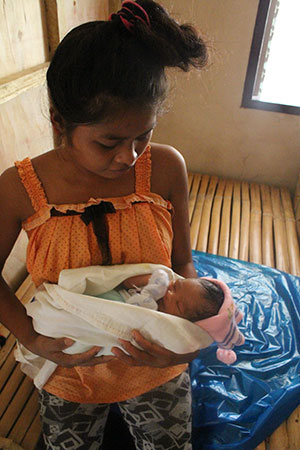News
New birthing facility provides culturally sensitive maternal care for indigenous women in the Philippines
- 24 October 2014
News
SITIO GAWASAN, Philippines – The road from Sitio Gawasan, on the Philippines island of Mindanao, to the nearest district health centre is a long one. Accessible only by foot or via bumpy motorcycle ride, the journey can take up to four hours – a trip few expectant mothers from the local indigenous Arumanen community can afford to take.
Those who did make the journey often had to forgo cultural practices and preferences associated with childbirth.
So when an old government structure was turned over to the community last year, Arumanen leaders set aside the space for a culturally sensitive birthing facility and health centre, aiming to make these vital services more readily available to local women.
With support from UNFPA, the National Commission on Indigenous Peoples, and the EU-funded Indigenous Peoples Maternal, Neonatal, Child Health and Nutrition Project in Mindanao, the new facility now offers pregnant indigenous women in the community an alternative to home delivery.

Emily Baluan, a midwife and member of the Arumanen community, was deployed to the centre by the Department of Health. Under her guidance, and with the blessing of the tribal elders, the community put up the walls, repaired faucets and fixtures, and improved the overall structure of the building.
Because the birthing facility was initiated and developed by the Arumanen community, it takes their cultural preferences into account.
Local leader Timuey Elino Pendaupan explained that if there is a problem during childbirth, members of the Arumanen community often perform a ritual for the mother and baby. The new birthing facility accommodates these traditions and has an outdoor space for the family to perform these rites.
The facility also offers women the option to choose between giving birth on a ‘native’ delivery bed made of bamboo or on a ‘standard’ delivery bed. Ms. Baluan helped to design the special bamboo delivery bed, which is favoured by many indigenous women.
The centre also facilitates other customs, like having a traditional birth attendant accompany the expectant mother.
“Women’s support systems, especially their families, are welcome here,” Ms. Baluan explained.
“We are very happy because now we have something to use here at the centre,” said Araceli Cawag, President of Sitio Gawasan Women’s Association and a community health team trainer.
Aileen, a young woman who had just given birth in the new facility, is pleased reproductive health services are more accessible now.
She told UNFPA that she does not want a big family. When the time comes, she will visit the centre to receive counselling on family planning and to get her baby immunized.